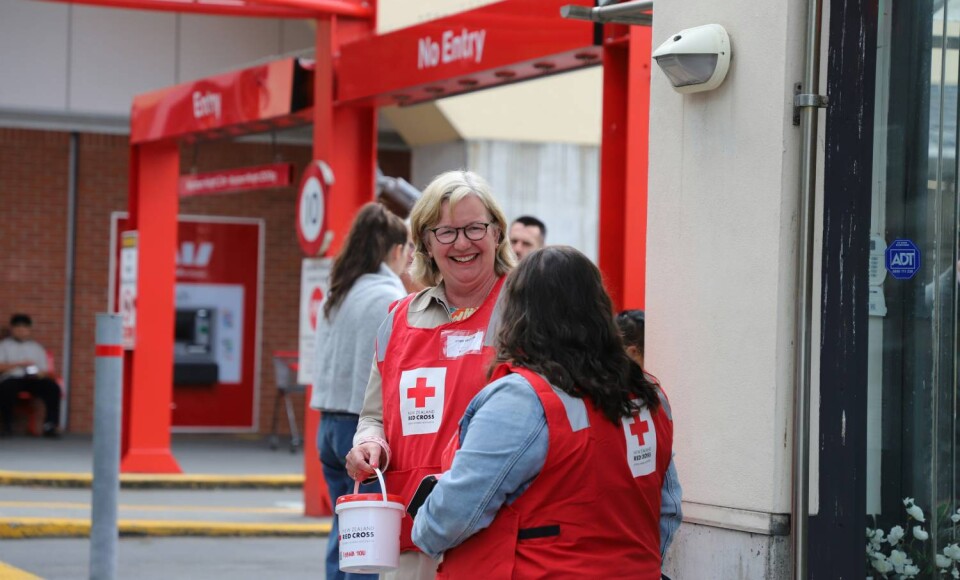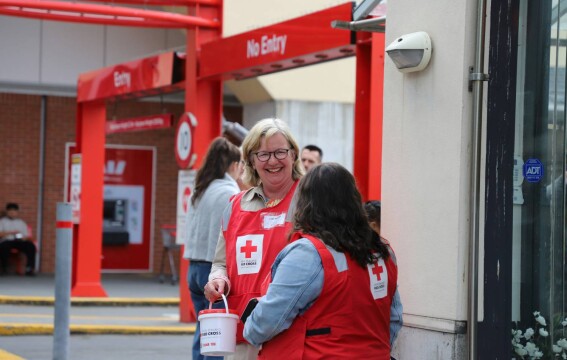Relaunching the international humanitarian law collection at Napier Library
7 May 2024


On 8 May 2024, Napier Library re-launched their international humanitarian law collection. First opened in 2006 by then New Zealand Red Cross National President Jocelyn Lady Keith CBE, the collection is once again available to the public after the library refurbished their buildings. The following is the speech delivered at the relaunch event by our current National President Kerry Nickels.
My name is Kerry Nickels and I’m National President of New Zealand Red Cross, as well as being on the Governing Board of the International Federation of Red Cross and Red Crescent Societies which oversees all National Societies.
I’m proud to welcome you to the re-launch of the international humanitarian law collection here at Napier Library. I want to speak about three things today:
- First, and most importantly, to assert that wars have laws.
- Second, I’ll touch on what is a very special day for our organisation – International Red Cross Red Crescent Day.
- Finally, I’ll come back to speak to the occasion for the day – the relaunch of this wonderful collection.
International humanitarian law – wars have laws
During my most recent term — my third —as National President, I’ve seen some enormous tests for the rule of order in the world. Most recently we’ve seen wars in Ukraine and Gaza, as well as conflict and rising tensions in the Middle East in the news, not to mention the return of the Taliban to Afghanistan. and many other lesser-known wars with hundreds of thousands of casualties. I’m thinking of Democratic Republic of the Congo, Sudan, and the war in Northern Ethiopia.
While our organisation — indeed our whole country — is a long way geographically from these wars we are, in other ways, on the front line. We’re supporting delegates to provide humanitarian assistance in these regions with the funding generated by our local Red Cross efforts and those of our philanthropic partners. Our migration programmes help to settle some of those most affected by these wars – refugees from Syria and Afghanistan topped the country’s intake this year.
Out of the public eye, the Red Cross and Red Crescent Movement is the guardian of the rules of war, of which the Geneva Convention is the most well-known.
This phrase ‘the rules of war’ is shorthand for what we’re here for today: international humanitarian law.
International humanitarian law sets standards that we expect armed forces to follow. Some of these standards are now almost considered self-evident – the right to treat the wounded without coming under attack, or the requirement that civilians aren’t targeted by the military.
New Zealand Red Cross and our Movement continue to advocate for more humanitarian protection in times of war. We also note increased interest in how we protect civilian populations in urban warfare, and we consider the implications of new issues such as autonomous weapons.
World Red Cross and Red Crescent Day
Today — Wednesday May 8 — is International Red Cross and Red Crescent Day. It’s a day to celebrate solidarity across the 191 National Societies and the unique role that our organisations collectively play.
This year’s theme is ‘keeping humanity alive’, a poignant reminder of the Movement’s enduring commitment to uphold human dignity, alleviate suffering, and help people in dire situations, especially in remote and hard-to-reach areas
In that spirit, I also want to acknowledge the humanitarians across the Red Cross and Red Crescent Movement who’ve been killed in the line of duty in the past year. We’ve lost ambulance drivers, healthcare workers, and people evacuating the wounded and vulnerable. We’ve lost employees and volunteers, who are at the heart of our movement.
We at New Zealand Red Cross are connected to all of those who were killed through our shared commitment to the principles of humanity at the heart of the Movement.
The relaunch of the international humanitarian law collection
The international humanitarian law collection at Napier Library was opened on 12 March 2006.
The collection — totaling more than 250 volumes — was opened by Jocely Lady Keith CBE, who was National President of New Zealand Red Cross at the time. She was joined by some of the best and brightest — not to mention most caring — of Hawke’s Bay. Members of the legal profession, our local Red Cross members, representatives from the library, as well as representatives from both of our international organisations, the International Committee of the Red Cross and the International Federation of Red Cross and Red Crescent Societies.
The collection is named after the founder of the Movement, Henri Dunant. After seeing the suffering of those injured on a battlefield in Solferino in Northern Italy, he rallied support from other humanitarians to establish the first Geneva Conventions and, with it, the basis of humanitarian rules of war that we know today.
These books are a taonga, or treasure, of our Movement – many of them are very rare and very precious. I understand that the full collection hasn’t been available for some time due to refurbishment of Napier Library. It’s fitting that the collection is now being relaunched on World Red Cross and Red Crescent Day in a year when international humanitarian law is so patently critical and relevant.
Internationally, we’re seeing a continuation of what the International Committee of the Red Cross has described as ‘complex humanitarian needs and overlapping, multiple crises’. Humanitarian needs have never been higher. The ICRC reports a record 339 million people needing humanitarian assistance and protection this year. This is more than double the number 10 years ago.
Many thanks to the Napier Branch for taking such good care of this precious collection. And thank you too to all of those organising and attending today’s event. I would encourage you all — whether lifetime members of the Red Cross or someone who just popped by — to take a moment to browse the collection. And, if a title takes your interest, then take the time to dive a little deeper.
You never know where it might take you.
More information
- Learn more about what we do in New Zealand.
Our work in New Zealand - Find out more about international humanitarian law.
International humanitarian law - In times of disasters, conflict, and other emergencies, we respond to the needs of vulnerable people around the world.
What we do overseas - Check out our other World Red Cross and Red Crescent Day stories.
What's important to us and our work – the value in our values
A little bit about the Florence Nightingale Medal
Good people doing great things
